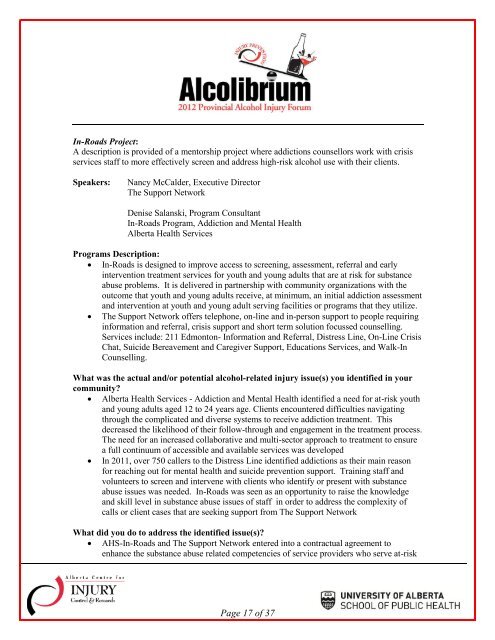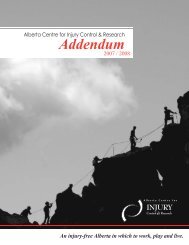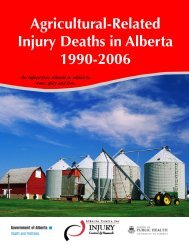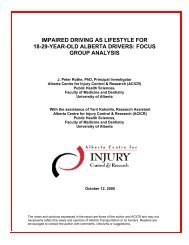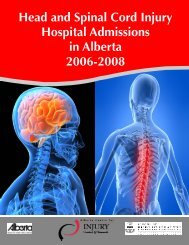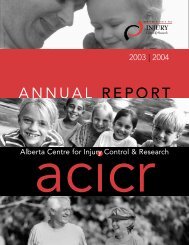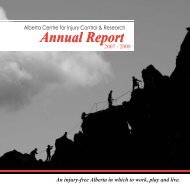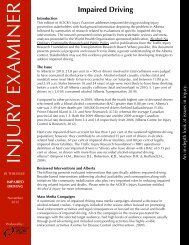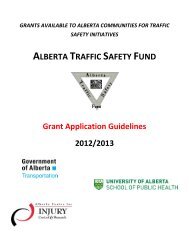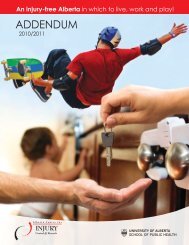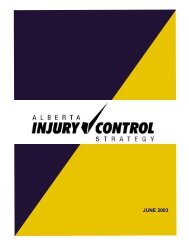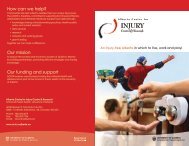Delegates Program - Alberta Centre for Injury Control & Research
Delegates Program - Alberta Centre for Injury Control & Research
Delegates Program - Alberta Centre for Injury Control & Research
You also want an ePaper? Increase the reach of your titles
YUMPU automatically turns print PDFs into web optimized ePapers that Google loves.
In-Roads Project:<br />
A description is provided of a mentorship project where addictions counsellors work with crisis<br />
services staff to more effectively screen and address high-risk alcohol use with their clients.<br />
Speakers:<br />
Nancy McCalder, Executive Director<br />
The Support Network<br />
Denise Salanski, <strong>Program</strong> Consultant<br />
In-Roads <strong>Program</strong>, Addiction and Mental Health<br />
<strong>Alberta</strong> Health Services<br />
<strong>Program</strong>s Description:<br />
In-Roads is designed to improve access to screening, assessment, referral and early<br />
intervention treatment services <strong>for</strong> youth and young adults that are at risk <strong>for</strong> substance<br />
abuse problems. It is delivered in partnership with community organizations with the<br />
outcome that youth and young adults receive, at minimum, an initial addiction assessment<br />
and intervention at youth and young adult serving facilities or programs that they utilize.<br />
The Support Network offers telephone, on-line and in-person support to people requiring<br />
in<strong>for</strong>mation and referral, crisis support and short term solution focussed counselling.<br />
Services include: 211 Edmonton- In<strong>for</strong>mation and Referral, Distress Line, On-Line Crisis<br />
Chat, Suicide Bereavement and Caregiver Support, Educations Services, and Walk-In<br />
Counselling.<br />
What was the actual and/or potential alcohol-related injury issue(s) you identified in your<br />
community?<br />
<strong>Alberta</strong> Health Services - Addiction and Mental Health identified a need <strong>for</strong> at-risk youth<br />
and young adults aged 12 to 24 years age. Clients encountered difficulties navigating<br />
through the complicated and diverse systems to receive addiction treatment. This<br />
decreased the likelihood of their follow-through and engagement in the treatment process.<br />
The need <strong>for</strong> an increased collaborative and multi-sector approach to treatment to ensure<br />
a full continuum of accessible and available services was developed<br />
In 2011, over 750 callers to the Distress Line identified addictions as their main reason<br />
<strong>for</strong> reaching out <strong>for</strong> mental health and suicide prevention support. Training staff and<br />
volunteers to screen and intervene with clients who identify or present with substance<br />
abuse issues was needed. In-Roads was seen as an opportunity to raise the knowledge<br />
and skill level in substance abuse issues of staff in order to address the complexity of<br />
calls or client cases that are seeking support from The Support Network<br />
What did you do to address the identified issue(s)?<br />
AHS-In-Roads and The Support Network entered into a contractual agreement to<br />
enhance the substance abuse related competencies of service providers who serve at-risk<br />
Page 17 of 37


